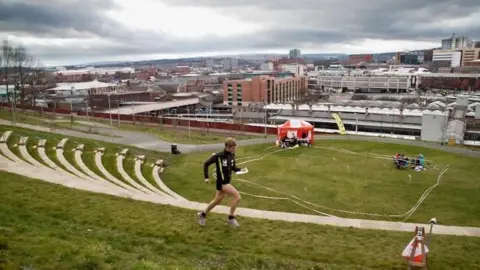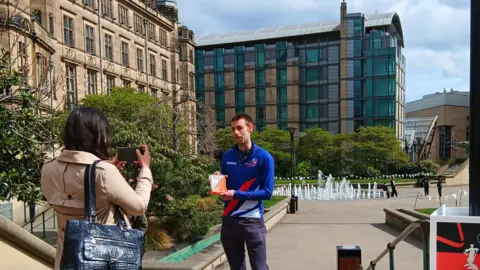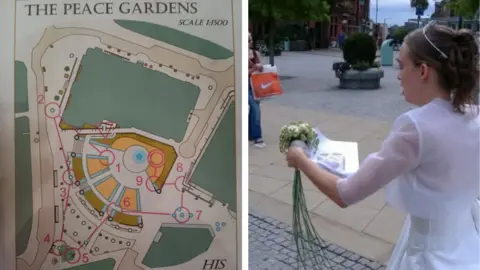City set to host UK's biggest orienteering event
 Dan Lane
Dan LaneMore than 2,600 people will take to the streets and woodlands of Sheffield this weekend to take part in the Jan Kjellström International Festival of Orienteering.
The annual competition is the biggest orienteering event in the UK and takes place in different locations across the country, with runners from 140 clubs and 28 countries.
It started in 1967 in memory of Swedish orienteer Jan Kjellström who helped develop the sport in the UK.
The event includes four races: a sprint race around Sheffield city centre, a middle distance race around Tankersley Woods, a long distance race around Wharncliffe Woods and a relay race in Middleton Park near Leeds.
 Jenny Johnson
Jenny JohnsonJenny and Oli Johnson are an orienteering power couple. Today, neither of them are elite racers, but in 2007 they took home the respective men's and women's overall champion trophies.
They are heavily involved in their local club, South Yorkshire Orienteering, which is hosting this year's JK Competition.
Jenny is publicity officer and Oli is setting the course for the long race around Wharncliffe Woods on Easter Sunday.
Jenny is also coaching South Yorkshire's female junior team and racing herself in the over 45 women's class.
"I have orienteered since I was really little," she says.
"My dad was a teacher so he was asked to help with a minibus of kids one weekend and he just really liked it, so when I was old enough he used to take me with him.
"I won the British Schools Orienteering Championships when I was about 10 and I was hooked.
"I came to Sheffield after uni because it's the best city for it. We've got so much great terrain on our doorsteps."
Jenny and Oli even included an orienteering race on their wedding day 19 years ago.
After the ceremony at Sheffield Town Hall they were each handed a map and completed a race around the Peace Gardens, which – in spite of a "massive" wedding dress, Jenny won.
 Jenny Johnson
Jenny JohnsonThe Sheffield races will set the orienteers a number of challenges, with the city centre buzzing with people going to the World Snooker Championships this weekend.
For the off-road races, Jenny says Tankersley Woods in particular will be difficult because of the ex-industrial landscape.
"You're given a map on a start line, you've got check points on that map that you have to visit in the order as quickly as possible.
"Tankersley woods is all bell pits, so it's really old mining. They're hills that have hollows in them, so it's really confusing on an orienteering map because you might have a checkpoint that you know is going to be in a hole but you have to run up a hill to get to it."
Despite Oli co-planning the course on Sunday – setting out 110 checkpoints in Wharncliffe Woods – the routes are shrouded in secrecy, even to Jenny.
"We've not been allowed to go into the areas being used in the competition this weekend for two years," she says.
"So none of us have run in Wharncliffe, Tankersley or the city centre. Obviously we can go into the city centre but if anybody was seen running with a map they would be disqualified."
Orienteers are encouraged to visualise the terrain from the map as they run around the course, says Jenny – an issue if, like her, you struggle to visualise things.
"You use the map to think what the ground will look like, and then you look at the ground and think where is that on the map?
"I have aphantasia, where people can't picture things in their head, but I was an elite orienteer, I ran for the British team.
"Our coaches used to say 'do not go into the checkpoint until you've got a picture in your head of what it will be like' and I used to think 'well, I can't' and I didn't realise that some people can do that, but it didn't matter – I could still be very good.
"So don't worry, if you want to have a go at orienteering and maps just seem like a different language that's fine. Even if you can't picture the ground from the map you can still do it. It's like working out a puzzle.
"That's the danger, if you start orienteering you might not want to stop."
Listen to highlights from South Yorkshire on BBC Sounds, catch up with the latest episode of Look North
